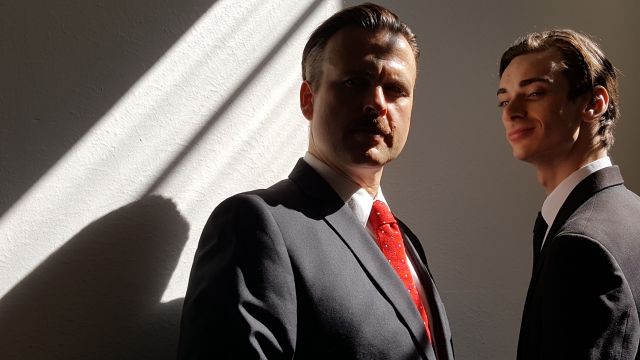Geli, Hitler’s Niece
A dramatisation of the liaison between Adolf Hitler and his half-niece ‘Geli’, this play is reminiscent – in reduced form - of Shakespeare’s Othello – that is, a vain, self-dramatising and vulnerable man is manipulated so that his ‘love’ turns to murderous hatred. Here, however, it’s 1931 and the man is Hitler (Matthew Richard Walsh) and the manipulators are Goebbels (Ben Byrne) and Himmler (Jonathan Harris), worried that their Führer is ‘distracted’ from his duties to the party by his rather adolescent obsession with his niece (Kelley Kerr Young), nineteen years his junior. They would prefer the airhead (or so they think) Eva Braun (Simone Bergamin) as his consort.
Playwright Enzo Condello portrays these figures and the historic (if disputed) events in elevated, ‘poetic’ dialogue – more akin to say, Racine to my mind, than Shakespeare – giving the characters, or attempting to give them, a dramatic status that is a poor fit with the sordid and – in this version – simple set of events.
There are more dangers in Mr Condello’s and, indeed, this production’s approach to this material. For those with some knowledge of the history (and thus knowing how the incidents end), the play may seem like highfalutin nonsense: the characters on stage bear little or no resemblance to the real people – and the production, in casting and design, makes no attempt to remedy that. For those, on the other hand, with little or no knowledge of the history, the play may be puzzling (and certainly repetitious) and bemusing. Mr Byrne and Mr Harris (the former with a surfeit of ‘product’ in his hair) play Goebbels and Himmler as a couple of malicious young spivs – ‘evil’ cut-outs. Ms Young’s Geli is poetic and sensitive and sympathetic to the plight of the Jews while the real Geli was, apparently, according to fact, a vivacious good time girl who turned heads in the street.
 Costume designer Nikki Komalarajun puts the men in suit coats and badly cut jodhpur-style trousers with a red stripe down the outer seam. Hitler’s red tie may be a reference to another vain and self-dramatising man. The women, meanwhile, are beyond dowdy in unflattering skirts and blouses – like 1950s lady golfers. Overall designer Sarah Yeung tries to overcome a very wide, very shallow stage (did the architect ever imagine drama on this stage?), but seems to have been defeated. Thus, there’s a lack of clarity about where we are in the story. Presumably it’s mostly Hitler’s luxury Munich apartment – but if so, why do Goebbels and Himmler wander in – without Hitler - to tell us their plans? Should the lighting change be more pronounced? Should they be further downstage? Director Wolf Heidecker seems defeated by this as with the text. Characters appear on stage out of a blackout, make their speeches and then disappear into another blackout. These awkward transitions point up the awkwardness of Mr Condello’s conception of the story – a story, moreover, rather thin on plot.
Costume designer Nikki Komalarajun puts the men in suit coats and badly cut jodhpur-style trousers with a red stripe down the outer seam. Hitler’s red tie may be a reference to another vain and self-dramatising man. The women, meanwhile, are beyond dowdy in unflattering skirts and blouses – like 1950s lady golfers. Overall designer Sarah Yeung tries to overcome a very wide, very shallow stage (did the architect ever imagine drama on this stage?), but seems to have been defeated. Thus, there’s a lack of clarity about where we are in the story. Presumably it’s mostly Hitler’s luxury Munich apartment – but if so, why do Goebbels and Himmler wander in – without Hitler - to tell us their plans? Should the lighting change be more pronounced? Should they be further downstage? Director Wolf Heidecker seems defeated by this as with the text. Characters appear on stage out of a blackout, make their speeches and then disappear into another blackout. These awkward transitions point up the awkwardness of Mr Condello’s conception of the story – a story, moreover, rather thin on plot.
A further difficulty is Mr Condello’s ‘poetic’ dialogue, which seems beyond the capabilities of all but Mr Harris and Mr Byrne – but they, being the villains, are allowed a more colloquial style. It is difficult to tell whether is it good poetic dialogue or tosh. Mr Walsh appears to have a diction problem – either that or the mode he has chosen for his Hitler really impedes clarity. Whenever his character gets worked up (frequently), it is difficult to understand a word he says. Ms Young fares little better – and as a result of that, plus her passive ‘suffering’, her character elicits little sympathy. As her mother, Angela, Caroline Ferguson is allowed little variation in her warnings and hand-wringings. Meanwhile, Ms Bergamin plays her Eva Braun (in real life supposedly rather bovine and blinkered) as a sharp and calculating ‘modern’ (and ‘strong’) young woman, warning Geli to be more like her. Surely not every woman in a play must be tough and smart? This is fashionable ideology at it’s worst.
Geli, Hitler’s Niece seems to me a misguided attempt to elevate an only superficially simple tale of sexual jealousy into something archetypal and ‘eternal’ – and an event that affected world history. The play and Mr Heidecker’s interpretation of it buys into the all-too-easy idea that after the Geli incident, Hitler’s pain and guilt led to an increase in his ‘inhumanity’. What really happened, no matter whose account you accept, is more intriguing, more psychologically complex, more human than what we get here.
Michael Brindley
Photographer: Sarah Yeung
Subscribe to our E-Newsletter, buy our latest print edition or find a Performing Arts book at Book Nook.

